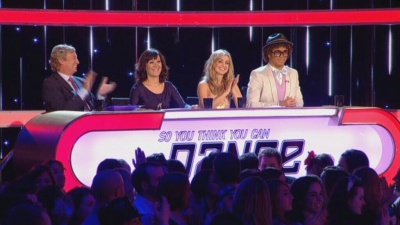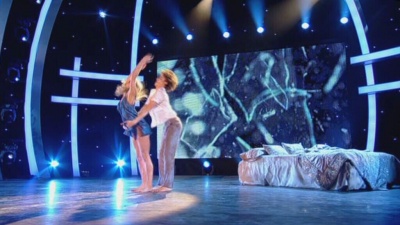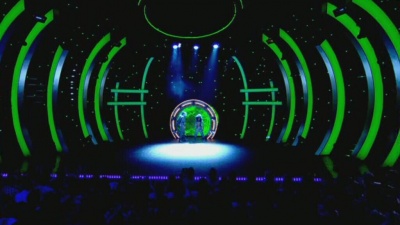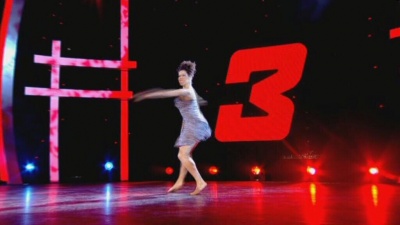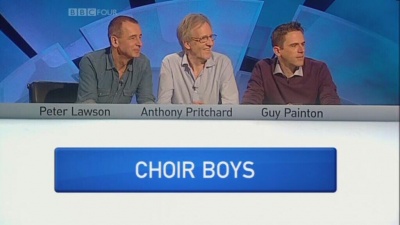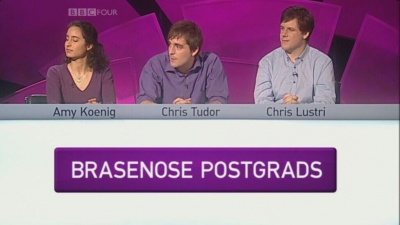Weaver's Week 2010-01-24
Last week | Weaver's Week Index | Next week
Contents |
So You Think You Can Dance
19 Entertainment / BBC for BBC1, Saturdays from 2 January
So You Think... You Can Dance? is not (sadly) a return for the education-through-quiz format that was an occasional feature of BBC1 from the mid-60s into the 1980s. (Who would host it these days? Someone who can do serious and frivolous, and someone who hosts a clever-clever quiz. Hmm. Why does the phrase "Adrian Chiles and Victoria Coren" spring to mind?)
No, it's a dance contest, in which (as host Cat Deeley says every five minutes) we'll be finding Britain's favourite dancer. Show one was the usual audition gubbins, though mercifully concentrating on the people who were decent rather than anyone who had three left feet. Nigel Lythgoe was mostly constructive in his comments, and the whole thing was very nice. And very rushed – the entire audition process, including classes to whittle 100 down to the final 14 – was condensed into 75 minutes of television.
Thus to the live shows, which will form the main focus of this review. The remaining contenders – seven gentlemen, seven ladies – have been paired off by a mysterious force. It was heavily implied that the pairings were random, but this was never stated in the narration. Were the pairs defined by the producers? Were they done by drawing names out of a hat? It's not clear.
What is clear is Arlene Phillips' comment that "it's the first time some of these dancers will have held someone of the opposite sex". Ooh, controversial, asserting that everyone involved in dance is a raging homosexual. Sadly, this isn't new territory for So You Think You Can Dance. There was some criticism in the American edition last summer when Nigel Lythgoe appeared to dismiss the chances of two male ballroom dancers just because they were men, and made remarks that some viewers found offensive. Mr. Lythgoe apologised as soon as he heard that people were offended, but Fox TV (the channel airing the show over there) remains unrepentant at offending the gay audience. Mercifully, the UK is far more at ease with this sort of thing than other parts of the world, the BBC doesn't set out to offend anyone, and Arlene is gently but firmly jeered for her comments – and receives a quizzical hard stare from Nigel.
Now, the format itself is complex. The couples will dance together for the first two shows, and will then break up and re-combine. At that point, the viewing audience will then be invited to vote for them as individuals, and saw them perform solo as well as in couples. Until then, we were asked to vote for the performance of the couple, as the couple. If we believe he was brilliant in his performance but she was a dead weight (or vice versa), there's no way to express this in the voting.
(Is anyone actually following this? Shall we just replace the voting system with the single transferable University Challenge quarter-final vote and hope no-one notices?)
The performances themselves are of a style drawn by the couple from a hat. We do get to see this, and there's plenty of footage from rehearsals and training. Some of the styles will match the training of the performers, some of the styles will be completely different. Hip-hop dancers getting a hip-hop routine are in luck; when they get the Viennese waltz, they're in trouble. The backstage footage contains some discussion with the choreographer assigned to that style, and there has been some criticism on air that the dancers want to be pushed harder, to be given more to do.
But none of this is particularly important: what really counts is the execution of the dances on the night. Here, we've been heavily impressed, both by the performances and by the reasonable reaction of the judges. All of the performances have been good. Most of them have been very good. Some have been excellent. The viewers will have formed an opinion of their own during the performance, and this view is tempered by the judging panel.
On the far right is Sisco Gomez, the man with the magic hat, who seems to think that everything is entirely wowsome. In shaping opinions, this isn't the most useful, as if all performances are cool, then how can one tell the excellent from the awe-inspiring? On his right is Louise Redknapp, the former popstar whose speciality seems to be stating the blindingly obvious.
We're finding more value in the opinions offered by Arlene Phillips and Nigel Lythgoe, both experienced television and entertainment dancers. They'll give their honest opinion, say what they think worked, say what they think didn't work, and give specific grounds for improvement. They don't just offer criticism, they offer constructive criticism, something for all the performers to take away and build on. Oftentimes, the criticism is accurate, though some of the contestants are getting an easier ride from these critics than we'd give them. Of course, when Nigel and Arlene like what they've seen, it can feel as though the panel is falling over itself to be nice, nicer, nicest, and the whole show has a feel of a Dale Winton convention. Lovely!
Lovely is also the hallmark of the set: a minimalist affair, a traditional large theatre stage, raised from the auditorium, with lights around the edges and a video wall behind. It provides its functions – allowing lighting and setting the mood – without becoming the star of the show, like some Eurovision sets we could mention.
After all the couples have danced, Cat declares the phone lines open with her trademark catchphrase "Calls cost 15p from a bee tea landline, calls from other networks may be more expensive and from mobiles will be considerably more." It's a bit of a long catchphrase, but it's better than "No like-y, no light-y." Lines aren't open for long, they usually close about half-way through the next show, in readiness for the results programme. The two couples with the fewest votes are in danger of elimination.
Of course there's a results show, which begins with a group routine, choreographed by some of the biggest names in the business. Unfortunately, these people are stars of a relatively small universe, and we have to be reminded of their work with performers of popular music such as Mr. Michael Jackson, Miss Beyoncé Knowles, and Miss Rihanna Fenty. For viewers who might not know who these people are, very brief extracts of their work with the choreographer are played. It's a coup for the show, but it's also going to go over the head of a lot of the audience.
Then comes what has to be one of the most ill-considered and confusing elimination routines since Britain's Got the Pop Factor asked its losing contestants to jump down a five-foot step. Two of the couples come up on stage, and – one by one – Cat will tell them that they're safe. Or they're not safe. Or she'll give the game away and say that one is safe and one isn't before saying who's in trouble. The industry standard for this kind of elimination is to have all of the contestants up on stage and dismiss them one by one, leaving pauses so large one could drive Simon Cowell's wage packet through the gaps. We'll give credit where it's due, tinkering with this format is a worthwhile experiment, we just don't think this particular device works at all well.
After a performance by a popular singer (or Cat's old mukka Lemar from Fame Academy), we reach the crunch. One by one, the four dancers in danger will perform a 30-second routine they've choreographed themselves. No outside assistance to critique, no partner to blame, just the performer, the stage, and half-a-minute to impress the judges. This bit is regularly ruined by the appearance of a 10-second countdown on the video-projection wall behind the dancer, and the audience starting to count down from ten. It's utterly pointless, we know the routine will finish on time, the shouting distracts the viewer and quite possibly the performer, and it is – by far – the worst part of the show. When they've all performed, the judges write down who they want to leave the show.
Before delivering his verdicts, Nigel has some words of encouragement for the dancers. They're good, he has spotted weaknesses that they can address, work they might do whether they remain in the competition or not. And he delivers this criticism, aimed at making improvements, before revealing the panel's decision. It's not based entirely on the 30-second routine, but also on their performance in that week's show, in previous shows, and from the beginning of the programme. In that respect, it's not dissimilar to the way the Star Academy judges selected their contestants to save from elimination.
As with the performers on the show, it's difficult to come up with some relevant criticism. The judges strike the right line, avoiding being nasty for the sake of it, but also avoiding sycophancy and over-niceness. The elimination process could stand some tidying up, and the countdown clock would be best left in Leeds. The show itself? We've watched all three live programmes so far, and we'll be avidly tuning in to the remainder.
University Challenge
Preliminary quarter-final 3: Imperial v Edinburgh
Imperial got here with a close win against Southampton, and a tonking of St Hugh's Oxford on 30 November. Edinburgh scored 170 against both UCLAN and Regent's Park Oxford, the latter on 14 December.
Imperial get the game going with Strait of the Week, it's Gibraltar, and pull further ahead with knowledge of the Big Mac index. They're only slightly less successful on a round of The Name's the Same, famous people who share the same name, often in different spellings. Edinburgh get off the mark with the scientific definition of thrust, and are right to look confident when asked a set of questions on the lanthanide elements, those ones that cling to the foot of the Periodic Table like limpets.
The first visual round is on the final stages of FIFA men's world cup, with the contestants asked for the winners, hosts, and year. Kieran Healy of Imperial gets all twelve elements, and helps his team to a 75-20 lead. It's a seriously impressive feat. The game goes on, with questions on girls' names invented by writers, and administrative divisions – a riding is a third part, we learn, and not the distance a horse could cover. Gilad Amit has a good guess on a starter that was leaning towards "Eunuchs", and all this helps Imperial rack up their score.
The audio round is on the composers of 19th century Italian opera. Or, as ITV is calling it these days, Friday night entertainment. The mind boggles, and Imperial's lead is up to 145-40. Is it too early to write "game over" in our book? Perhaps not, though a missignal from Edinburgh doesn't help keep our pen off the page. Thumper says they're doing right to keep buzzing, and add points from Nobel chemistry prize citations – they could have had more if Thumper had let them interrupt. The host misses a sneer opportunity when Omar Kayyam is confused with Wordsworth, but he's right to reject "limestone" when "lime" is the required answer – the latter is also known as "quicklime", something entirely different.
The second visual round is on the artists for frescoes, Imperial's lead has been hovering at around 100 points through this third stanza, and now stands at 165-75. Thumper wonders why people don't know Gladstone was British prime minister more often than anyone else – he might care to remember that these students don't have these facts in living memory. Edinburgh get a set of bonuses in which the five leading vowels appear once, Thumper gives the vowels, the contestants the words. That's a shockingly good idea for a game in its own right, really.
But Imperial are moving ahead with the next two starters, and with less than four minutes to play, that really is going to be an impregnable lead. There's a good little question here: if people don't know which country the PRI ran for twenty years, they might well remember the new president Vincente Fox. [1] Ethnic minorities in EU member states are an unpromising set of bonuses, but we're sure they would have said Slovenia had the gong not got in the way. Imperial has won, 240-110.
Imperial's best buzzer was Kieran Healy, six starters and no missignals. The side made 21/42 bonuses with one missignal. Hugh Brechin led Edinburgh with three starters and no missignals; his side went 11/17 bonuses with one missignal. The overall accuracy rate was 52/84.
Next match (PQF4): Emmanuel Cambridge v Jesus Oxford
[1] Mexico.
Only Connect
Heat 3: Choir Boys v Brasenose Postgrads
Thumper, would you please stop over-running like this, otherwise we'll send you to bed for two weeks without asking a single question. To anyone. The Choir Boys are members of the Brighton and Hove (Actually) Gay Men's Chorus; the connection between the Brasenose Postgrads should be obvious.
Brasenose begin with the audio clue, take all 40 seconds, but have no idea. "They're all to do with weather" is their stab in the dark; "they're all about eye colour" suggest the Choir Boys for a bonus. Their own question might be movements in Scottish dance, but not quite: they're all military punishments. Brasenose have the picture clue: a stripey flower, some shapes, a horn, some beans – ah, they're all French, and that's a point. Choir Boys have one of those collections that seem to make no sense, until one of them buzzes on 39.5 seconds, and then umms forever. Rules in conkers is the answer, apparently – us neither.
There's another bizarre collection for Brasenose, and one of the teams asks "What's Hello?" A widely-known celebrity magazine that doesn't appear in Australia, and it leads to a bonus point for the Choir Boys. The final set is characters and films, but there has to be a guess. First deaths in the movie? All get shot? In Elizabeth, a movie set in the 16th century? No, they were played by footballers. After a low-scoring round, the Choir Boys lead 2-1.
Round two follows sharply, and Brasenose begin with a picture series. Fruit and veg, a white house, and a Sunday roast. Where's this one going? A loaf of bread? Nicknames for prime ministers? No, it's piggies, and these little teams shall have none. The Choir Boys think the first clue is about things the Queen pledges to do at her coronation, but it's actually levels of government secrecy. Brasenose pick up that the next sequence is carats of gold, gamble for 24ct, but incorrectly, allowing the opposition a point.
The Choir Boys can't even decide which question they're going to pick, never mind agree on the answer. It's true that these are the Monro hills, but where is the sequence going? Ben Nevis, the highest in the UK, and they're surprised to get two points. Brasenose get this week's Shakespeare question, and it's the characters who end up dead in Hamlet. What, they all end up dead? Two points to Brasenose, one SPOILER! to the host. Oh. Choir Boys pick up two points after spelling NATO in the NATO alphabet, so lead 7-3 going into the connecting wall.
Choir Boys step up to the plate first, and think of Archbishops of Canterbury and famous Gordons. The man with The Krypton Factor was Mr. Burns, not Burn – he'll end up being a novelist. Jameses? Balls? They're not even trying anything here, but the Gordons eventually come out. Are there oysters to be found? Time expires and they've only got one of the groups. The team pick up one bonus on palaces, but two other groups evade the side for a total of Three points!
Brasenose have something to tilt at, and think about an Old connection. Are there male animals? Goodness, so there are. And some teeth? There are some teeth. They've plenty of time, but only the last three chances to split the groups. They think about some Normans, try some Normans, but don't get their last two sets sorted in their chances. Who was Norman Parkinson anyway? Three connections, two groups, Five points! Choir Boys still lead, 10-8.
It's all to play in the final round, and it's the exact inverse of those bonuses on University Challenge: the vowels have gone for a walk, only the consonants are left. Parts of a musical work kick us off, and even though the Choir Boys are linked by a love of music, the round is drawn 2-2. Parties from the 2005 election goes to a 1-1 tie. European scientists allows Brasenose to draw level with a 3-1 draw. Textile art techniques only allows one question to be answered, it's picked up by Amy Koenig from Brasenose, and they've snuck to a 15-14 win. Goodness, that was close! Who cares that the scoring wasn't up to much, the drama was there in spades.
Next week's desperate contestants: Philosophers v Hitchhikers
Mastermind
Heat 15
Chris Askew begins this week, with the Life and Music of Lou Reed (b 1942). The New York native spent the 1960s in the Velvet Underground before embarking on a solo career, which has continued to this day. His best-known album is "Transformer" (1972), which includes such classics as "Satellite of Love" and "Perfect Day". Readers may recall the latter from the BBC's promotional campaign a few years back. There are mentions for the banana cover and a one-trick pony, which the contender isn't, ending on 11 (2).
Nathan Jones is going to tell us about Carl Gustav Mannerheim (1867-1951). Who? Well, that shows just how little we know about Europe. The subject was a leader of the Finnish army after the country gained her independence from Russia in 1917. He came out of retirement when Russia attacked in 1939, and was the president of Finland from 1944-46. Even though he couldn't speak a word of Finnish. The contender is more Lordi than Lapponia, ending on 14 (1).
Traditional subject alert! Gerard McHugh will take Classical Greek mythology, the tales told by the Ancient Greeks to rationalise the world. The contender says he's been a classicist all his life, but this is a tremendously large subject so he may be at a disadvantage. As the round progresses, it's clear that he knows a lot, but the question setters know an inch more, and the final score is 4 (4).
Finally, Gina Jolliffe has been revising the Life and Times of Martin Nadaud (1815-98), a journeyman builder who rose to become a leader in the 1848 revolution in France and sat in parliament. He was subsequently exiled to Wimbledon, where he became a teacher. We wonder how the contender can live about 20km from Nadaud's birthplace (the subject of the first question) and still see BBC television, surely it's not available outside the UK, Ireland, Belgium, and the Netherlands... There are a lot of questions on the 1870 revolution and commune, and after what seems to be fewer questions than normal, the contender ends on 7 (1).
Gerard McHugh finds the general knowledge round more to his taste, dredging up a moderately obscure member of the Dad's Army cast and the life story of Pocahontas. His final score is 10 (5). Gina Jolliffe advances her score with Maxim's maximum velocity gun, corns on the feet, and the career of Joyce Grenfell, to end on 16 (1).
The top six runners-up:
- John Cooper 29 (3)
- Ian Scott Massie 26 (2)
- Les Morrell 26 (3)
- Colin Wilson 25 (0)
- Peter Cowan 25 (2)
- William de Ath 25 (4)
Chris Askew will no doubt have groaned when watching Games Britannia last month, as the fact that the Monopoly tokens came from the inventor's wife's charm bracelet was named there. We reckon Peter Mandelson and Ken Clarke will be moderately amused at being confused, and the final score is 19 (4).
Nathan Jones requires six to win, but begins with a pass. He can't afford many more of those! The contender recalls Bugs Bunny's inspiration, and it's quickly clear he'll pass to get more questions in. He gets the sixth correct answer after about a minute, and goes on to remember Carbon-14. The final score is 21 (4), a winning total this week.
This Week And Next
The annual UKGameshows.com Poll of the Year has finished, and the winners have been announced in a glittering ceremony, sponsored by Bother's Bar, catering for all your bothering needs since 2004.
The Hall of Fame award for Britain's Favourite New Game Show was won by The Cube, with Pointless and The Krypton Factor 3.0 sharing a distant second.
The Hall of SHAME award for the country's Least Favourite New Game Show was taken by The Colour of Money, which managed to poll more than one vote per ballot; Heads or Tails came a relatively close second.
The Golden Fiver, given to the most popular game show in production, was shared between The Cube and Only Connect. Third place went to the web wonder Accumulate!.
The early favourite for next year's awards was unveiled on Schalg den Raab in Germany last weekend, where two men watched extra-springy toasters, and waited to catch the bread as it arose from the machinery. It's more challenging than Heads or Tails.
Sport Relief unveiled its programme of events to raise a lot of money for worthy causes. Britain's favourite amateur sportswoman Helen Skelton is already somewhere down the Amazon, Christine Bleakley of The Nod Show will water-ski across the English Channel (that's unless the cold weather returns and she can walk it), and David Walliams will cycle from John O'Groats to Lands' End. Let's Dance for Comic Relief returns for a new series, and Frank Skinner hosts A Question of Sport Relief. Masterchef's usual cooks are replaced by the panel from Match of the Day, we expect the judges will be watching the cheffing on monitors that we can't see and discussing the results. Paddy McGuinness revives We are the Champions, and there's a celebrity version of Strictly Come Dancing. How is that different from the original, pray tell? The main Sport Relief campaign runs from 19-21 March.
Before then, we have an imported version of So You Think You Can Dance (Living, 2pm Sunday), a new series of House Gift (ITV, 2pm weekdays), the return of The Write Stuff (Radio 4, 6.30 Wednesday), and the last ever Celebrity Big Brother (C4, from 8.30 Friday). So You Think... continues at 6.30 and 8.20 on Saturday.
To have Weaver's Week emailed to you on publication day, receive our exclusive TV roundup of the game shows in the week ahead, and chat to other ukgameshows.com readers, sign up to our Yahoo! Group.


